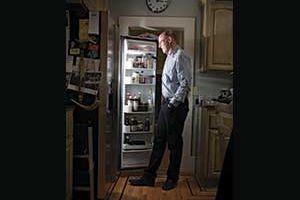
Photo: Martin Klimek/Zuma Press
For a special section in our May/June issue, we asked some of our favorite writers about their favorite nonfiction books. Here are In Defense of Food and The Omnivore’s Dilemma author Michael Pollan‘s answers:
Mother Jones: Are there any under-the-radar books about nutrition and food politics you’d recommend to fans of your work?
Michael Pollan: There have been a handful of books on food politics that I consider landmarks: Food Politics by Marion Nestle; Eric Schlosser’s Fast Food Nation (though hardly under the radar); Joan Gussow’s This Organic Life, the first and best book on eating locally; Raj Patel’s Stuffed and Starved takes the conversation to the global level; as does The End of Food by Paul Roberts. There’s a strong shelf that will get anybody up to speed. On nutrition, besides Nestle’s What to Eat, be sure to read Gary Taube’s Good Calories, Bad Calories, which effectively demolishes the lipid hypothesis that has ruled the whole food conversation for 40 years.
MJ: Which nonfiction book do you foist upon all of your friends and relatives? Why?
MP: Lately I’m pushing them to read Cornered by Barry C. Lynn, a really original book on how monopolization is eroding our political culture.
MJ: Which nonfiction book have you reread the most times? What’s so good about it?
MP: I find I return to Wendell Berry‘s essays over and over, which can be read on so many levels. Thoreau’s Walden continues to nourish and aggravate; The Elements of Style, by Strunk and White, and the essays of George Orwell all get an annual workout.
MJ: Is there a nonfiction book that someone recommended to you when were a kid that has left a lasting impression? Who recommended it, and why was it so special?
MP: My parents gave me George Plimpton’s Paper Lion when I was 13 or 14, and I think in retrospect it’s shaped my journalism in many ways—but especially the humor he squeezes out of participation.
















